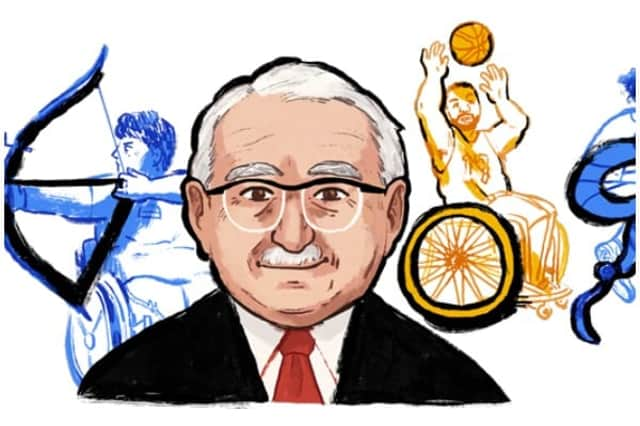Today's Google Doodle is celebrating Professor Sir Ludwig Guttmann - here's how the British neurologist paved the way for Paralympics


Google is celebrating the life and work of Professor Sir Ludwig Guttmann by honouring him with a Doodle today (Sat 3 July).
But who is Professor Sir Ludwig Guttmann and why is Google celebrating him?
Here’s what you need to know.
Who is Professor Sir Ludwig Guttmann?
Advertisement
Hide AdAdvertisement
Hide AdGoogle’s Doodle - which is illustrated by Baltimore-based guest artist Ashanti Fortson - is celebrating the 122nd birthday of Jewish, German-born British neurologist Professor Sir Ludwig “Poppa” Guttmann, who was the founder of the Paralympic movement.
Guttmann was born in Tost, Germany - which is now Toszek, Poland - on 3 July 1899.
He started studying medicine at the University of Breslau in 1918, before continuing his studies in Würzburg and Freiburg and receiving his Doctorate in Medicine in 1924, writing his thesis on tumours of the trachea.
What did he do?
Guttmann began research on spinal cord injuries and performed several neurosurgical procedures.
Advertisement
Hide AdAdvertisement
Hide AdHe then rose to prominence as one of Germany’s top neurosurgeons by his early thirties.
However, due to the rise of the Nazi party and the passing of the Nuremberg Laws in 1933, Guttmann was prevented from practising medicine professionally.
After Kristallnacht in 1938 and the increasing persecution of Jews in Germany, Guttmann and his family were forced to leave Germany and escaped to England in 1939.
Guttmann then advanced his research in paraplegia while in England, and in 1944 he put his innovative approach into practice as the director of the National Spinal Injuries Center at Stoke Mandeville Hospital.
What role did he play in the Paralympic Games?
Advertisement
Hide AdAdvertisement
Hide AdGuttmann organised a 16-person archery contest in 1948, which was one of the first official competitive sporting events for wheelchair users.
The competition - which was later called the ‘Stoke Mandeville Games’ or the ‘Olympics for the Disabled’ - broke down barriers for disability and gained the attention of global medical and sporting communities.
In 1960, Guttmann then facilitated the International Stoke Mandeville Games, following the 1960 Summer Olympics. The event featured more than 400 athletes from 23 countries and was the first of many Paralympic Games.
The Olympics were being held in Rome that year and Guttman - who became known as the ‘father of the Paralympics’ - saw no reason why the International Stoke Mandeville Games could not be held there either.
Advertisement
Hide AdAdvertisement
Hide AdThe Games were then held for the first time in the Olympics venue immediately after the Olympic Games in Rome, where athletes shared the same accommodation and venues as their Olympic counterparts.
Guttmann also founded the International Medical Society of Paraplegia - also known as the International Spinal Cord Society - and the British Sports Association for the Disabled.
He received numerous accolades for his contributions and was knighted by Her Majesty the Queen in 1966.